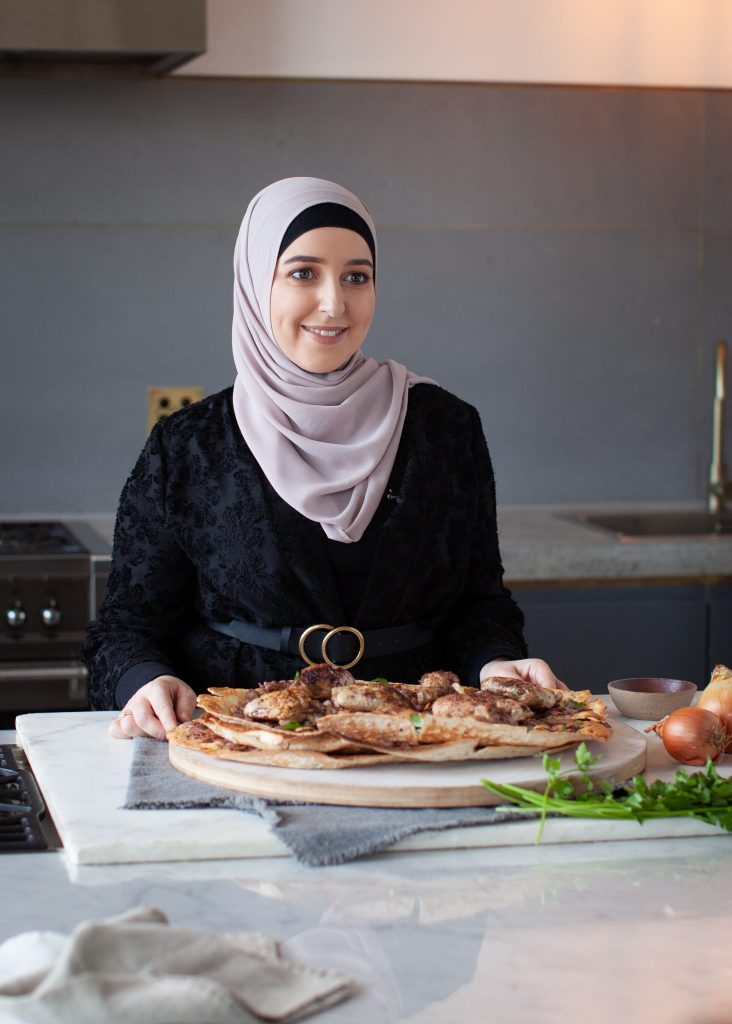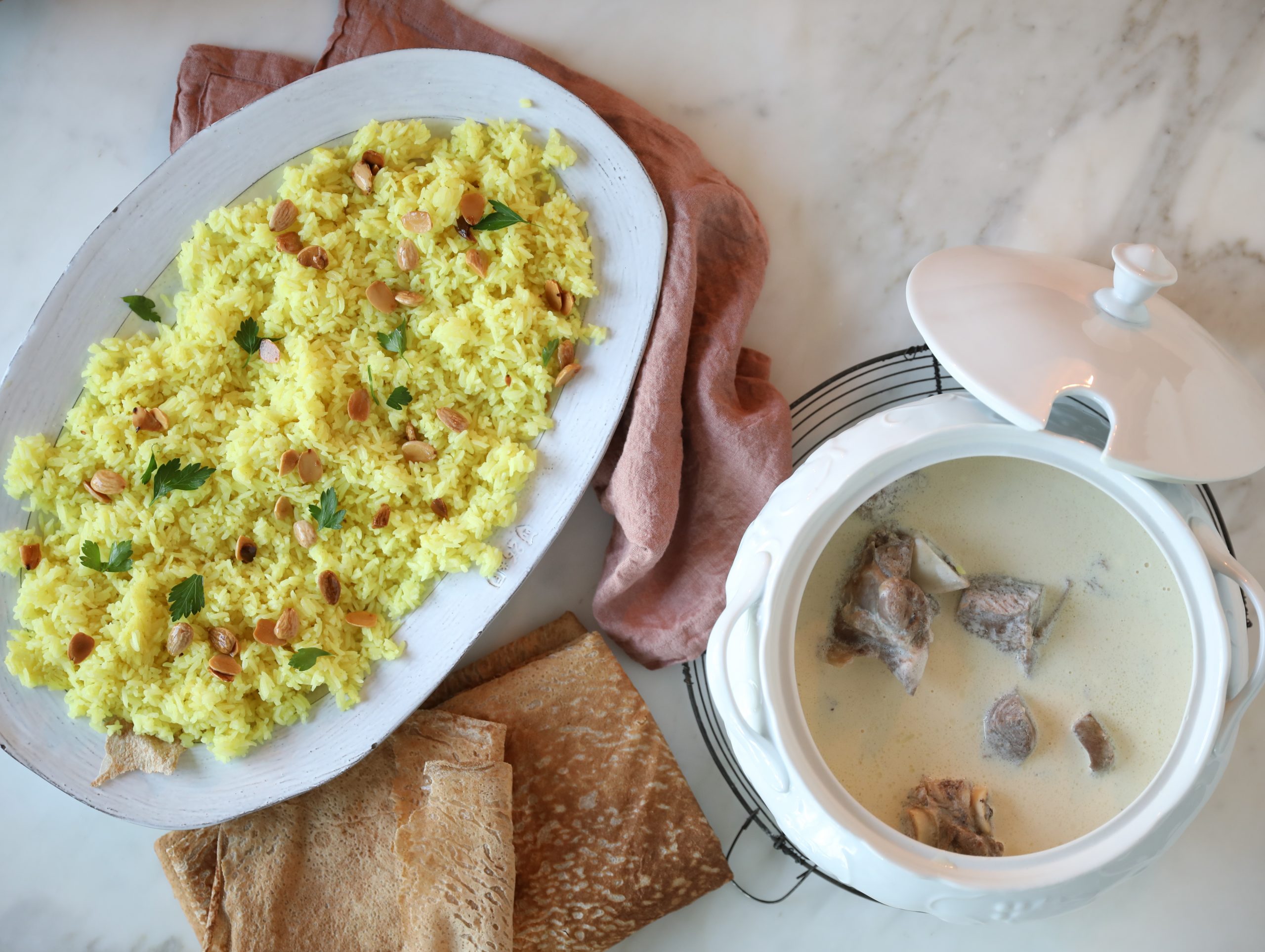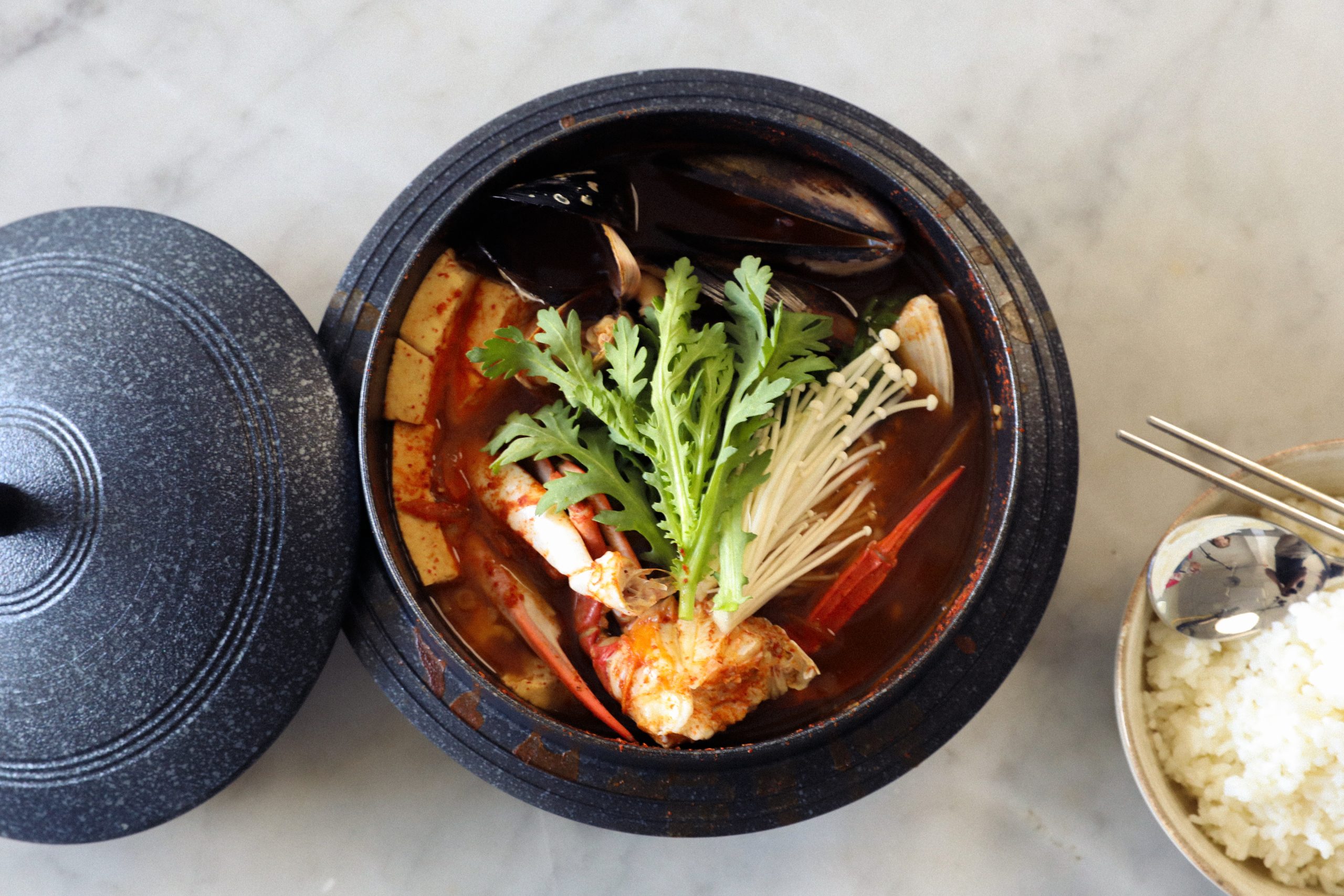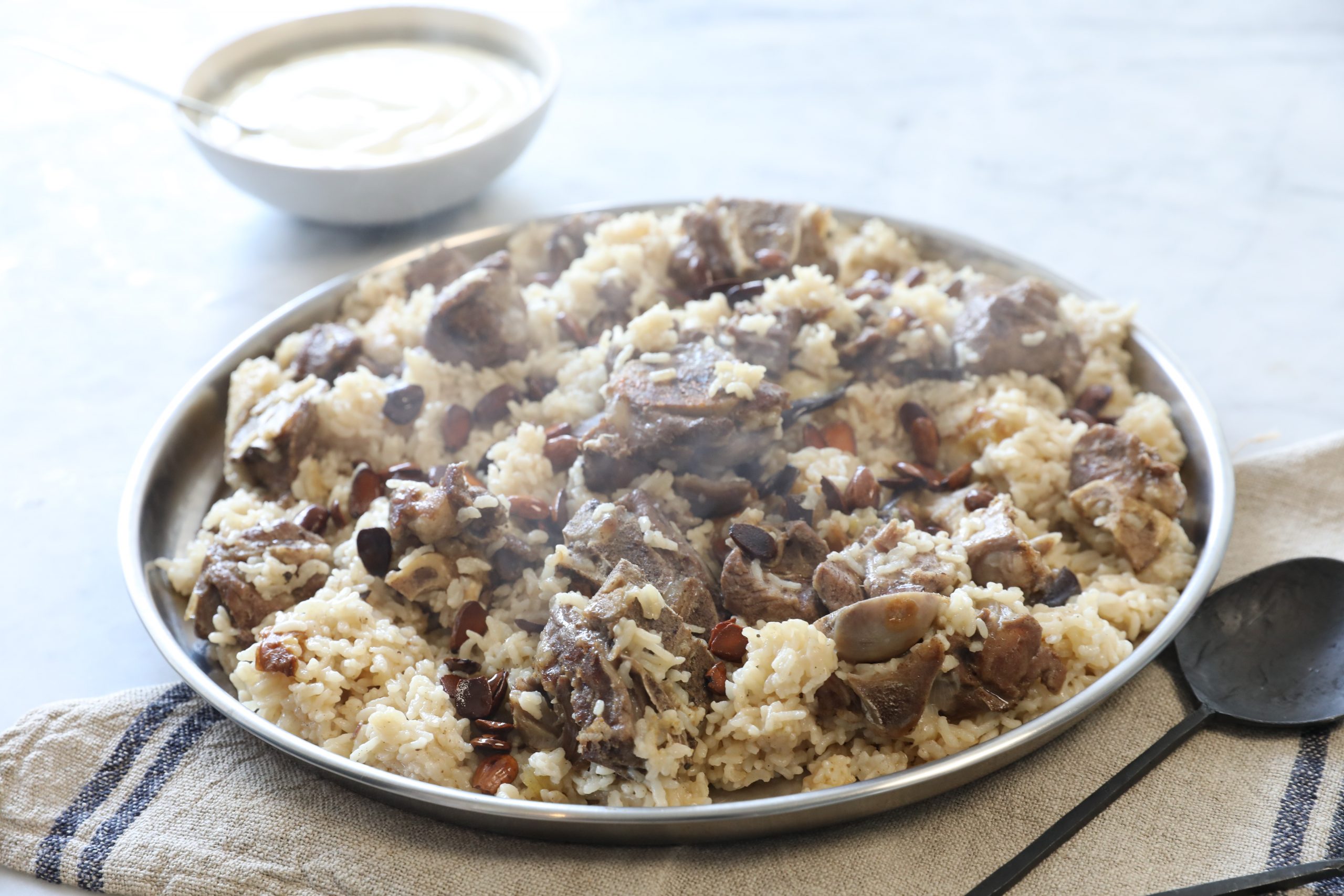Walla’s Jordanian Mansaf
 Jordan
Jordan 
I’m Palestinian from Jordan married to a Palestinian from Syria, living in Australia – so my cooking is practically a combination of so many different cultures and traditions.
My mother’s family fled Palestine during the 1948 Palestinian Nakba, 72 years ago. Nakba translates into English as the ‘catastrophe’ or ‘disaster’ and it is the name we give to what happened when 750,000 Palestinians were expelled from their homes during the 1948 war. My grandparents were able to take nothing more than the key to their home and what they could carry on their backs. It was the beginning of the Palestinian diaspora and my mother and her five brothers and three sisters were born in Jordan where our extended family still is now.
My father was born in Palestine and fled to Jordan with his family during the ‘Six Day War’ in 1967. Those six days changed the map of the Middle East when after years of tension and skirmishes between Israel and neighbouring Egypt, Syria and Jordan, Israeli troops took the Sinai Peninsula and Gaza Strip from Egypt, the West Bank and East Jerusalem from Jordan, and the Golan Heights from Syria. More than 50 years later, the tensions still continue but, for my father’s family, it meant fleeing their home forever.
Neither of my parents have been back to Palestine and I have sadly never visited either. One day I will but in the meantime, I want to pass a love for Palestine to my children as my parents and grandparents have passed it to me.
My parents met and married in Jordan then moved to Saudi Arabia for my father’s work but when my mother fell pregnant, she would go back to Jordan to give birth surrounded by her family and that’s where I was born.
I lived my childhood in Saudi Arabia and started school there. We lived in a compound with people from all over the Arab world, so my mother learned how to cook heaps of dishes from various different cultures. Every week, one family in the compound would prepare food and invite the other families over. I remember eating really exquisite food that other people had prepared – a variety of Egyptian, Lebanese and Syrian dishes.
At 8 years of age, my parents decided to make the move to Australia and I have been living in Sydney ever since. My parents, three siblings and I live close, a suburb away from each other but almost all my relatives and cousins live in Jordan, so we visit every couple of years to reconnect with family.
I met my husband Khalil in Australia. He was here to complete his PhD and mutual friends introduced us to each other. Khalil is half-Palestinian, half-Syrian. He was born in Syria and lived the majority of his life there. After the war in Syria erupted, Khalil’s family fled to different parts of the world. His mother and brothers are now living in Russia and his sister in the Emirates. Thankfully, Khalil and I had our wedding in Jordan where my extended family was able to attend and his family (who were living in Syria at the time) also travelled to be there with us on our special day.
I did not cook at all as a child. When I was a teenager, my mum asked me to help her cutting up the salad and for years that was about the only thing I knew how to make. My mother would always make the most delicious food for us but I was never interested in cooking or even watching her cook. When I was at school, my mum encouraged me to study as I always had endless homework and I wasn’t expected to do much in the kitchen.
When I was at University, I found myself starting to want to make desserts. I had a sweet tooth and discovered a passion for experimenting with sweets. My pharmacy degree was pretty full on so I still wasn’t expected to help much in the kitchen, nor was I that interested in learning. I really didn’t know how to cook a single thing when I first got married. After marriage, when there was no one to cook for me, I started experimenting with food. My husband, who was living with a group of his friends before we got married, had more experience than I did and had a few dishes he was a pro at! Our first meal as a married couple was actually prepared by Khalil – his signature spaghetti bolognese.
When I wanted to prepare food, I was constantly on the phone with mum getting her guidance to cook traditional meals and searching the internet for non-traditional meals I could try out too. My mum provided the best recipes for Palestinian and Jordanian dishes, my mother-in-law passed down her awesome Syrian recipes on phone calls and WhatsApp, and the internet helped out with all the non-traditional meals I love experimenting with. I love using food to dip in and out of lots of different cultures.
Thankfully Khalil doesn’t mind my experimenting with food; he actually encourages the adventure, hence the wide array of dishes I can now cook 8 years later. My cooking skills have improved so much that I now showcase the dishes I make to the world, while teaching others how to make them, through my Instagram account @walla_abueid.
In Jordan, preparing food gets so much love and attention that ladies are willing to spend hours in the kitchen in order to produce a delicious meal at the end of the day. I grew up watching my mother and grandmother bond over cooking. My grandmother would spend hours sitting on the floor swirling jameed (a rock-like substance made from goats milk) around in a clay bowl with some water till it turns into a paste which she uses to make Mansaf with.
When Khalil first visited Jordan, he was faced with so many cultural challenges surrounding food. In Jordan, men eat the Mansaf with their hands rather than using a spoon. They form the rice and yogurt mix into a ball and bite into it – all without spilling a drop. Khalil wasn’t used to this but he tried eating that way to get the full cultural experience and to honour my family’s culture. It is also common for elders to eat sitting on the floor rather than at a dining table. When we had dinner at my grandparents’ house, Khalil found this challenging too. It’s physically really quite hard to get comfortable if you haven’t grown up doing it.
I was also exposed to different Syrian food traditions when I met Khalil’s family. I have been fascinated and love how much culture shapes a person’s food experience and I’m so glad my cooking is now infused with a whole variety of different cultures from all over the world.
Share this story

Place some vegetable oil in a pot, add onions and meat pieces and cook for a few minutes until meat is browned on all sides. Season the meat with salt, vegetta and pepper to taste then add cardamon, bay leaves and cinnamon. Cover the meat in water. Once the water boils, reduce heat, cover and cook for 1 hour until meat is fully cooked. This step is best done in a pressure cooker.
While the meat is cooking, place yogurt, jameed and sour cream in a large saucepan and blend (using a hand blender) until they mix well.
Place the pot over medium heat and slowly bring yogurt mixture to boil, stirring constantly with a wooden spoon. Once the yogurt mixture boils, add cooked meat pieces and pass meat stock through a sieve to collect a delicious clear stock. Add this stock to the yogurt, one cup at a time, until a good runny consistency is reached. Season with salt if required.
Reduce heat to low and allow yogurt to softly simmer uncovered for 10 minutes.
Cook rice according to packet instructions while adding tumeric to it.
In a small skillet, place some vegetable oil and add almonds over medium heat. Stir nuts continuously until they become golden. Remove from heat and set aside.
Tear the bread pieces and arrange, overlapping, on a large serving tray. Sprinkle some of the yogurt mixture over the bread so that it softens.
Arrange rice over the bread, spoon the meat over the rice and then spoon the nuts on top. Enjoy!




